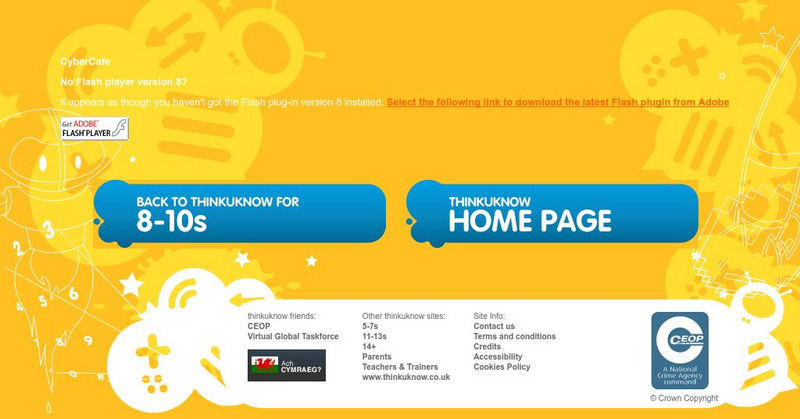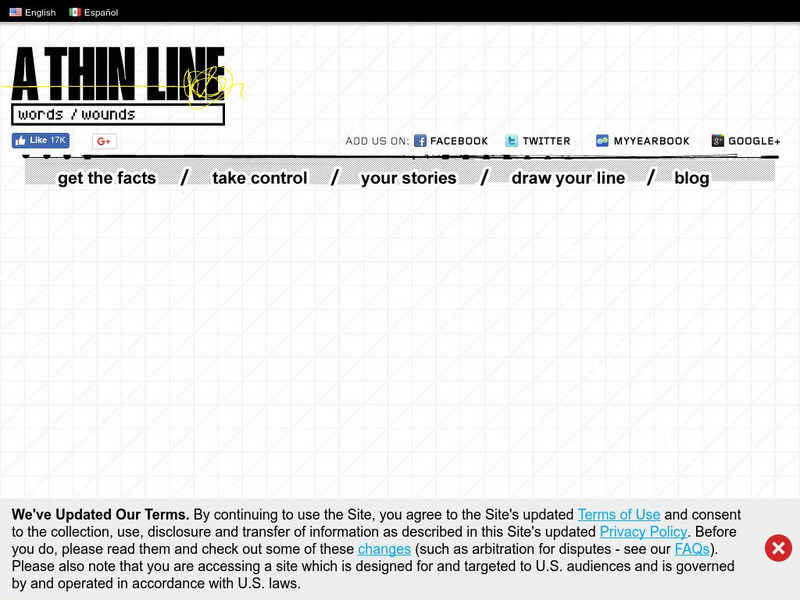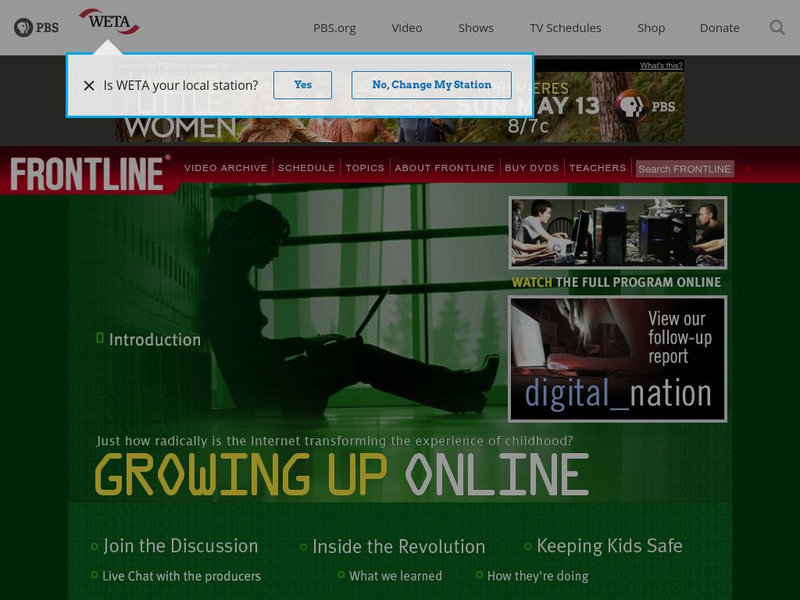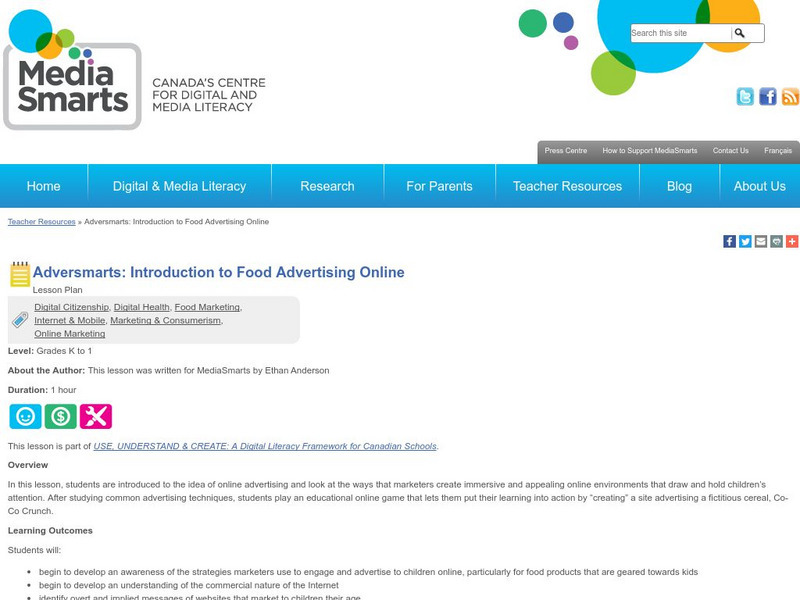Other
Tech in Ctrl: Communication & Collaboration: Working Together Digitally
In this instructional activity, students will apply prior knowledge and skills to collaborate digitally and model positive attributes of an effective digital citizen. They will discover how to manage and improve their communication...
Media Smarts
Media Awareness Network: Privacy Pirates
Sail away on the open seas in order to protect your online privacy from the privacy pirates. This animated game helps students become responsible digital citizens as they learn how to keep their personal information secure.
Other
Think U Know: Cyber Cafe
The Cyber Cafe from Think U Know offers a safe and interactive environment for students to learn and practice responsible digital citizenship. Learn how to safely use email, social media, and search the web.
Code.org
Code.org: Cs Fundamentals: Course D
Students develop their understanding of loops, conditionals, and events. Beyond coding, students learn about digital citizenship.
Common Sense Media
Common Sense Media: Education: Lesson: Pause and Think
[Free Registration/Login Required] In this lesson plan, the Digital Citizens teach students how to be safe, responsible, and respectful online. Includes slideshow, video, lesson plan, song and lyrics, poster, coloring book, and resources...
Common Sense Media
Common Sense Media: Education: Lesson: That's Private!
[Free Registration/Login Required] Staying safe online is a lot like staying safe in the real world. By helping a Digital Citizen sign up for a new app, 2nd graders learn about the kinds of information they should keep to themselves when...
Common Sense Media
Common Sense Media: We Are Civil Communicators
When we talk about our personal beliefs and politics, passions can run high -- especially when we're online. These intense moments can often lead to tit-for-tat insults, or worse. But, if addressed calmly and coolly, they can be an...
Other
A Thin Line: Digital Rights Project
Find out about MTV's Digital Rights Project, "A Thin Line." Look for details about digital safety and security, impact of digital disrespect, cyberbullying, sexting, etc.
PBS
Pbs Frontline: Growing Up Online
Information and analysis on the practices and habits of children and teens who live their lives online. Focus is on teen culture in the digital age and on how online media have intensified fears of the dangerous dimensions of adolescence.
Other
Symantec Corporation: Symantec Security Center
An information resource on threats to computer security, how to identify and report viruses, up-to-date articles on computer system vulnerabilities, etc.
REMC Association of Michigan
Remc Association of Michigan: 21 Things4 Students: 6. Cyber Safety
This learning module is made up of nine quests organized into sets of three. In the first set, students learn how to protect themselves online. In the second, they go through three simulations/games to learn how to protect their...
Other
Computer Knowledge: Computer Knowledge Virus Tutorial
This site contains a tutorial which includes an overview of viruses, types of viruses, the history of viruses, and virus prevention.
Other
Wosu Public Media: Are You Digi Fit?: Choose to Be Positive With Others Online
This lesson teaches children how to behave appropriately when interacting with others online. They are guided in understanding how their words can be perceived by others online and how to deal with an online bully. Includes links to two...
Edutopia
Edutopia: Common Core in Action: Teaching Online Ethics
Looking at the responsible use of intellectual property is one key element of digital citizenship that can be connected to eighth grade Common Core Standards. How do we as educators help students respect other people's work and not abuse...
Other
Wabash College: Introduction to Network Etiquette
This site from Wabash College gives rules not only for internet etiquette, but more specifically for etiquette concerning networks. This site is particularly relevant to college students.
Media Smarts
Media Smarts: Adversmarts: Introduction to Food Advertising Online
Media Smarts provides digital and media literacy lessons for students. In this lesson, young students will learn about online advertisements targeted to children. Students will play on online game; they will create an advertisement for a...
Google
Google: Be Internet Awesome: Interland
Kids can play their way to being Internet Awesome with Interland, an online adventure that puts the key lessons of digital safety into hands-on practice with four challenging games. Play your way to being an Internet Legend!
Media Smarts
Media Smarts: Promoting Ethical Behaviour Online: My Virtual Life Lesson
In this lesson, students learn about ways to manage their privacy and reputation online by exploring their digital presence and to make good choices about sharing other people's content online. Students explore how they are portrayed...
Other
Common Sense Media: Strong Passwords [Pdf]
In this instructional activity, students learn how to create secure passwords in order to protect their private information and accounts online.
Other
Common Sense Media: The Power of Words [Pdf]
Students consider that while they are enjoying their favorite websites they may encounter messages from other kids that can make them feel angry, hurt, sad, or fearful. They explore ways to handle cyberbullying and how to respond in the...
Other
Common Sense Media: Private and Personal Information [Pdf]
In this lesson plan learners learn the difference between private information and personal information, distinguishing what is safe and unsafe to share online.
Other
Common Sense Media: Talking Safely Online [Pdf]
In this lesson young scholars learn that they can develop rewarding online relationships, but that they should never reveal private information to a person they know only online without asking their parent or guardian for permission.
Other
Cic Online: Cyberbullying: Identify and Respond [Pdf]
With this resource, learn how to know when cyberbullying is happening and how to confront the problem. PDF (requires Adobe Reader).
Other
Cyber Smart!: Whose Is It, Anyway? [Pdf]
A worksheet to accompany a lesson where students learn that, although the Internet makes it very easy, copying others' work and presenting it as one's own is unethical, unfair, and unacceptable.
Other popular searches
- Computer Netiquette
- Internet Netiquette
- Technology Ethics Netiquette
- Email Netiquette
- Computer Safety and Privacy
- Computer Safety Rules
- Netiquette Lesson Plan
- Netiquette and the Internet
- Netiquette Leson Plan
- Emoticons and Netiquette
- Netiquette of Teachers
- Computer Safety for Kids










